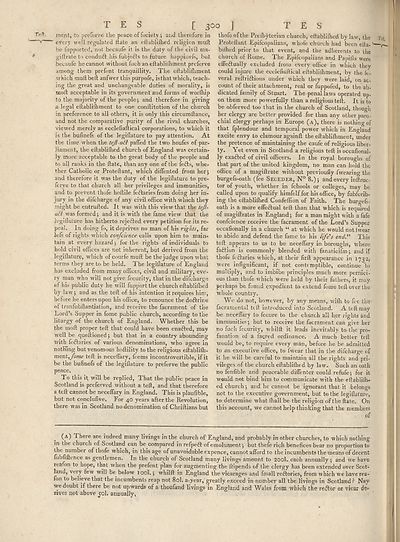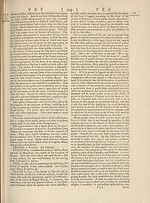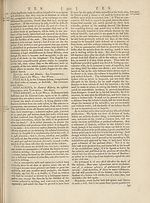Encyclopaedia Britannica, or, a Dictionary of arts, sciences, and miscellaneous literature : enlarged and improved. Illustrated with nearly six hundred engravings > Volume 20, SUI-ZYM
(342) Page 300
Download files
Complete book:
Individual page:
Thumbnail gallery: Grid view | List view

T E S [ 300 j T E S
raent, to prefwve the peace of foe let y and therefore in
every well regulated ilate an eftabltflied religion mult
he fupported, not becaufe it is the duty of the civil ma-
giftrate to conduft his fubjedts to future happinefs, but
becaufe he cannot without fueh an eftablilhment preferve
among them prefent tranquillity. The eitabliflunent
which mullbeft anfwer this purpofe, is that which, teach¬
ing the great and unchangeable duties of morality, is
moil acceptable in its government and forms of worfhip
to the majority of the people*, and therefore in giving
a legal eftablilhment to one conftitution of the church
in preference to all others, it is only this circumftance,
and not the comparative purity of the rival churches,
viewed merely as eeclefiaftical corporations, to which it
is the bufinefs of the legiflature to pay attention. At
the time when the tejl att paffed the two houfes of par¬
liament, the eftabliftied church of England was certain¬
ly more acceptable to the great body of the people and
to all ranks in the ftate, than any one of the fe&s, whe¬
ther Catholic or Proteftant, which diflented from her j
and therefore it was the duty of the legiflature to pre¬
ferve to that church all her privileges and immunities,
and to prevent thofe hoftile feffariesfrom doing her in¬
jury in the difeharge of any civil office with which they
might be entrufted. It was with this view that the tejl-
a£i was formed; and it is with the fame view that the
fegillature has hitherto rejected every petition for its re¬
peal. In doing £>, it deprives no man of his rights, far
lefs of rights which cor/cience calls upon him to main¬
tain at every hazard; for the rights of individuals to
hold civil offices are not inherent, but derived from the
legiilature, which of courfe muft be the judge upon what
terms they are to be held. The legiflature of England
has excluded from many offices, civil and military, eve¬
ry man who will not give fecurity, that in the difeharge
of his public duty he will fupport the church eftabliftied
by law; and as the teft of his intention it requires him,
before he enters upon his office, to renounce the do£lrir.e
of tranfubftantiation, and receive the facrament of the
Lord’s Supper in fome public church, according to the
liturgy of the church of England. Whether this be
the moft proper teft that could have been enadfted, may
well be queftioned; but that in a country abounding
with feftaries of various denominations, who agree in
nothing but venomous hoftility to the religious eftablifh-
mer\\, fome teft is neceflary, feems incontrovertible, if it
be the bufinefs of the legiffature to preferve the public
peace.
To this it will be replied, That the public peace in
Scotland is preferved without a teft, and that therefore
a teft cannot be neceffary in England. This is plaufible,
but not conclufive. For 40 years after the Revolution,
there was in Scotland no denomination of Chriftians but
thofe of the Prefbyterian church, eftablifhed bylaw, the
Proteftant Epifcopalians, whole church had been efta-
biffied prior to that event, and the adherents to the
church of Rome. The Epifcopalians and Papifts were
elFe&ually excluded from every office in which they
could injure the ecclefiaftical eftablifliment, by the ft-
veral reftri&ions under which they were laid, on ac¬
count of their attachment, real or fuppofed, to the ab¬
dicated family of Stuart. The penal laws operated up.
on them more powerfully than a religious teft. It is to
be obferved too that in the church of Scotland, though
her clergy are better provided for than any other paro¬
chial clergy perhaps in Europe (a), there is nothing of
that fplendour and temporal power which in England
excite envy to clamour againft the eftabliftiment, under
the pretence of maintaining the caufe of religious liber¬
ty. Yet even in Scotland a religious teft is occafional-
ly exadted of civil officers. In the royal boroughs of
that part of the united kingdom, no man can hold the
office of a magiftrate without previoufly fwearing the
burgefs-oath (fee Seceder, N° 8.); and every inftruc-
tor of youth, whether in fchools or colleges, may be
called upon to qualify himfelf for his office, by fubferib-
ing the eftabliftied Confeffion of Faith. The burgefs-
oath is a more effedtual teft than that which is required
of magiftrates in England; for a man might with a fafe
confcience receive the facrament of the Lord’s Supper
occalionally in a church “ at which he would not Iwear
to abide and defend the fame to his /ife',s end.'1'1 This
teft appears to us to be neceflary in boroughs, where
fadtion is commonly blended with fanaticifm; and if
thofe kdlaries which, at their firft appearance in 1732,
were infignificant, if not contemptible, continue to
multiply, and to imbibe principles much more pernici¬
ous than thofe which were held by their fathers, it may
perhaps be found expedient to extend fome teft over the
whole country.
We do not, however, by any means, wiffi to fee the
facramental teft introduced into Scotland. A teft may
be neceflary to fecure to the church all her rights and
immunities; but to receive the facrament can give her
no fuch fecurity, whiltt it leads inevitably to the pro¬
fanation of a fagred ordinance. A much better tert
would be, to require every man, before he be admitted
to an executive office, to fwear that in the difeharge of
it he will be careful to maintain all the rights and pri¬
vileges of the church eftablifhed by law. Such an oath
no fenfible and peaceable diflenter could refufe; for it
would not bind him to communicate with the eftablifh¬
ed church; and he cannot be ignorant that it belongs
not to the executive government, but to the legiflature,
to determine what ffiall be the religion of the ftate. On
this account, we cannot help thinking that the members
(a) I here are indeed many livings in the church of England, and probably in other churches, to which nothing
in the church of Scotland can be compared in refpedt of emolument; but thefe ricli benefices bear no proportion to
the number of thofe which, in this age of unavoidable expence, cannot afford to the incumbents the means of decent
lubfiftence as gentlemen. In the church of Scotland many livings amount to 200I. each annually; and we have
reafon to hope, that when the prefent plan for augmenting the ftipends of the clergy has been extended over Scot¬
land, veiy few will be. below tool.; whilft in England the vicarages and fmall reftories, from which we have rea¬
fon to believe that the incumbents reap not 80I. a-year, greatly exceed in number all the livings in Scotland ? Nay
vve doubt if there be not upwards of a thoufand livings in England and Wales from which the reffor or vicar de»
rives not above jol. annually.
raent, to prefwve the peace of foe let y and therefore in
every well regulated ilate an eftabltflied religion mult
he fupported, not becaufe it is the duty of the civil ma-
giftrate to conduft his fubjedts to future happinefs, but
becaufe he cannot without fueh an eftablilhment preferve
among them prefent tranquillity. The eitabliflunent
which mullbeft anfwer this purpofe, is that which, teach¬
ing the great and unchangeable duties of morality, is
moil acceptable in its government and forms of worfhip
to the majority of the people*, and therefore in giving
a legal eftablilhment to one conftitution of the church
in preference to all others, it is only this circumftance,
and not the comparative purity of the rival churches,
viewed merely as eeclefiaftical corporations, to which it
is the bufinefs of the legiflature to pay attention. At
the time when the tejl att paffed the two houfes of par¬
liament, the eftabliftied church of England was certain¬
ly more acceptable to the great body of the people and
to all ranks in the ftate, than any one of the fe&s, whe¬
ther Catholic or Proteftant, which diflented from her j
and therefore it was the duty of the legiflature to pre¬
ferve to that church all her privileges and immunities,
and to prevent thofe hoftile feffariesfrom doing her in¬
jury in the difeharge of any civil office with which they
might be entrufted. It was with this view that the tejl-
a£i was formed; and it is with the fame view that the
fegillature has hitherto rejected every petition for its re¬
peal. In doing £>, it deprives no man of his rights, far
lefs of rights which cor/cience calls upon him to main¬
tain at every hazard; for the rights of individuals to
hold civil offices are not inherent, but derived from the
legiilature, which of courfe muft be the judge upon what
terms they are to be held. The legiflature of England
has excluded from many offices, civil and military, eve¬
ry man who will not give fecurity, that in the difeharge
of his public duty he will fupport the church eftabliftied
by law; and as the teft of his intention it requires him,
before he enters upon his office, to renounce the do£lrir.e
of tranfubftantiation, and receive the facrament of the
Lord’s Supper in fome public church, according to the
liturgy of the church of England. Whether this be
the moft proper teft that could have been enadfted, may
well be queftioned; but that in a country abounding
with feftaries of various denominations, who agree in
nothing but venomous hoftility to the religious eftablifh-
mer\\, fome teft is neceflary, feems incontrovertible, if it
be the bufinefs of the legiffature to preferve the public
peace.
To this it will be replied, That the public peace in
Scotland is preferved without a teft, and that therefore
a teft cannot be neceffary in England. This is plaufible,
but not conclufive. For 40 years after the Revolution,
there was in Scotland no denomination of Chriftians but
thofe of the Prefbyterian church, eftablifhed bylaw, the
Proteftant Epifcopalians, whole church had been efta-
biffied prior to that event, and the adherents to the
church of Rome. The Epifcopalians and Papifts were
elFe&ually excluded from every office in which they
could injure the ecclefiaftical eftablifliment, by the ft-
veral reftri&ions under which they were laid, on ac¬
count of their attachment, real or fuppofed, to the ab¬
dicated family of Stuart. The penal laws operated up.
on them more powerfully than a religious teft. It is to
be obferved too that in the church of Scotland, though
her clergy are better provided for than any other paro¬
chial clergy perhaps in Europe (a), there is nothing of
that fplendour and temporal power which in England
excite envy to clamour againft the eftabliftiment, under
the pretence of maintaining the caufe of religious liber¬
ty. Yet even in Scotland a religious teft is occafional-
ly exadted of civil officers. In the royal boroughs of
that part of the united kingdom, no man can hold the
office of a magiftrate without previoufly fwearing the
burgefs-oath (fee Seceder, N° 8.); and every inftruc-
tor of youth, whether in fchools or colleges, may be
called upon to qualify himfelf for his office, by fubferib-
ing the eftabliftied Confeffion of Faith. The burgefs-
oath is a more effedtual teft than that which is required
of magiftrates in England; for a man might with a fafe
confcience receive the facrament of the Lord’s Supper
occalionally in a church “ at which he would not Iwear
to abide and defend the fame to his /ife',s end.'1'1 This
teft appears to us to be neceflary in boroughs, where
fadtion is commonly blended with fanaticifm; and if
thofe kdlaries which, at their firft appearance in 1732,
were infignificant, if not contemptible, continue to
multiply, and to imbibe principles much more pernici¬
ous than thofe which were held by their fathers, it may
perhaps be found expedient to extend fome teft over the
whole country.
We do not, however, by any means, wiffi to fee the
facramental teft introduced into Scotland. A teft may
be neceflary to fecure to the church all her rights and
immunities; but to receive the facrament can give her
no fuch fecurity, whiltt it leads inevitably to the pro¬
fanation of a fagred ordinance. A much better tert
would be, to require every man, before he be admitted
to an executive office, to fwear that in the difeharge of
it he will be careful to maintain all the rights and pri¬
vileges of the church eftablifhed by law. Such an oath
no fenfible and peaceable diflenter could refufe; for it
would not bind him to communicate with the eftablifh¬
ed church; and he cannot be ignorant that it belongs
not to the executive government, but to the legiflature,
to determine what ffiall be the religion of the ftate. On
this account, we cannot help thinking that the members
(a) I here are indeed many livings in the church of England, and probably in other churches, to which nothing
in the church of Scotland can be compared in refpedt of emolument; but thefe ricli benefices bear no proportion to
the number of thofe which, in this age of unavoidable expence, cannot afford to the incumbents the means of decent
lubfiftence as gentlemen. In the church of Scotland many livings amount to 200I. each annually; and we have
reafon to hope, that when the prefent plan for augmenting the ftipends of the clergy has been extended over Scot¬
land, veiy few will be. below tool.; whilft in England the vicarages and fmall reftories, from which we have rea¬
fon to believe that the incumbents reap not 80I. a-year, greatly exceed in number all the livings in Scotland ? Nay
vve doubt if there be not upwards of a thoufand livings in England and Wales from which the reffor or vicar de»
rives not above jol. annually.
Set display mode to:
![]() Universal Viewer |
Universal Viewer | ![]() Mirador |
Large image | Transcription
Mirador |
Large image | Transcription
Images and transcriptions on this page, including medium image downloads, may be used under the Creative Commons Attribution 4.0 International Licence unless otherwise stated. ![]()
| Permanent URL | https://digital.nls.uk/192278993 |
|---|
| Description | Plates 516, 519 and 520 missing. |
|---|---|
| Attribution and copyright: |
|
| Description | Ten editions of 'Encyclopaedia Britannica', issued from 1768-1903, in 231 volumes. Originally issued in 100 weekly parts (3 volumes) between 1768 and 1771 by publishers: Colin Macfarquhar and Andrew Bell (Edinburgh); editor: William Smellie: engraver: Andrew Bell. Expanded editions in the 19th century featured more volumes and contributions from leading experts in their fields. Managed and published in Edinburgh up to the 9th edition (25 volumes, from 1875-1889); the 10th edition (1902-1903) re-issued the 9th edition, with 11 supplementary volumes. |
|---|---|
| Additional NLS resources: |
|

